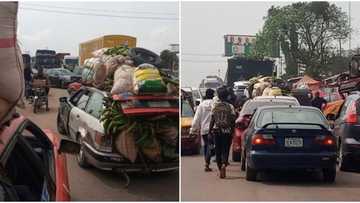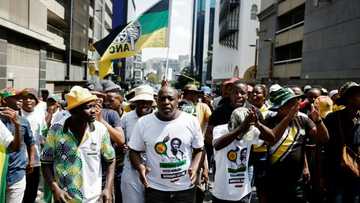Peru tourism industry in 'free fall' as Machu Picchu closed by protests

Source: AFP
Decked out in helmet, belt, gold-plated armor and sandals, Juan Pablo Huanacchini Mamani gazes out vacantly from the Ollantaytambo Inca ruins in Peru.
His Inca warrior costume sparkles in the sunlight, but the 48-year-old feels no joy.
Huanacchini has worked in the tourism industry at this gateway town to Machu Picchu, the Inca citadel that is the jewel of Peruvian tourism -- since he was a child.
But the Ollantaytambo site that normally welcomes 4,000 visitors a day is deserted.
Peru's vital tourism industry has been decimated by weeks of social unrest that has left 48 people dead in clashes between protesters and security forces since December 7.
Peru attracted 4.5 million tourists a year before the Covid-19 pandemic.
PAY ATTENTION: Сheck out news that is picked exactly for YOU ➡️ find the “Recommended for you” block on the home page and enjoy!
The sector was supposed to rebound in 2022 and 2023, but Peru's latest political crisis has left those working in tourism dismayed.
"Look, there's no one. It's empty," moaned Huanacchini.

Source: AFP
Situated around 60 kilometers (40 miles) from Cusco -- the old Inca capital that acts as a hub for those visiting Machu Picchu -- Ollantaytambo has its own ruins of an Inca citadel that are worth visiting, if not as spectacular as those at Machu Picchu.
But protesters allow it to open only at weekends, when barely 100 tourists visit.
Roadblocks, airport closures and the suspension of the train service that serves Machu Picchu have left tourists wary of visiting the area for fear of getting stranded.
'We're very sad'
Peru's southern Andean regions that are home to large populations of poor Indigenous people have borne the brunt of the unrest.
Peru has been in crisis since then-president Pedro Castillo -- who has Indigenous roots -- attempted to dissolve congress and rule by decree.
He was subsequently impeached, arrested and charged with rebellion.
Protesters are demanding the resignation of his successor Dina Boluarte, immediate elections, a new constitution and the dissolution of the legislature.

Source: AFP
But their stamina is having a knock-on effect.
"We're very sad. We live off tourism, if there's no tourism...." said Huanacchini.
"We live day to day. Sometimes I earn 100 soles (26 cents). How am I going to earn anything if there is no one? This is a terrible crisis."
According to the tourism ministry, the unrest is costing the country 25 million soles a day with hotel occupancy down 83 percent.
Cusco's regional tourism director Abel Alberto Matto Leiva says 75 percent of Cusco's one million population "works directly or indirectly in tourism. 9,000 guides, 5,000 (trekking) porters, 2,500 travel agents and a whole chain" comprising hotels, restaurants, taxis.
Some 20,000 people are unemployed but that figure is expected to grow six-fold in March.

Read also
Commuters Stranded as Protesters Block Lagos-Benin Expressway Over Fuel Price Hike, Scarcity
In Cusco, many hotels and restaurants have closed to save costs.
'No one is helping us'
"We are in free fall and we don't know when this will change," said Henry Yabar, vice-president of the hotel chamber in Cusco.

Source: AFP
He shut his three-star, 15-room hotel.
"Right now there are about 250 people (tourists) in Cusco, in high season we can have 10,000."
"It has been a fatal blow," with 95 percent cancellations and up to 30 percent of the 1,200 hotels -- most of which are run locally -- going out of business.
"The government needs to throw us a lifeline," launch an emergency plan and suspend taxes and repayments of loans taken out during the pandemic, said Yabar, who said he expects things to pick up, for those that survive, in July.
In the tourist market close to the central square in Cusco, most stalls are closed.
Surrounded by hand-made hats, Filomena Quispe, 67, has spent 35 years selling handicrafts to tourists.
"I haven't sold a single sol. What can we do? Close our stall and go," she said.
"We haven't sold enough all month to eat."
Tearfully, Quispe said she is living off her meagre savings.
"No one is helping us at all. We artisans are completely forgotten."
Some 14,000 artisans have seen their income practically disappear, according to authorities.
But for tourists, there is one benefit.
"The visit has been fantastic. It's empty though, there's absolutely no one around apart from us," said Sandeep Cliff, a doctor from London, about his trip to Ollantaytambo.
However, his dream holiday hit a snag.
"We were told literally a week before we arrived that Machu Picchu is closed."
But he held no grudge to the locals.
"It's messed our holiday up a bit, but they have a reason (for protesting), and we've got to respect that."
Source: AFP




